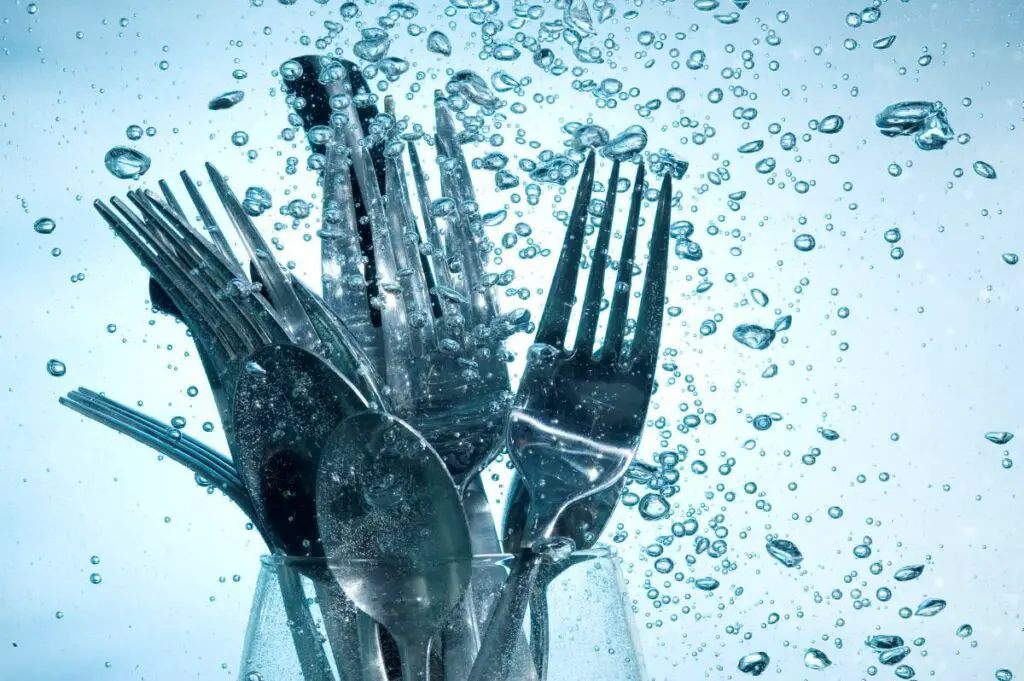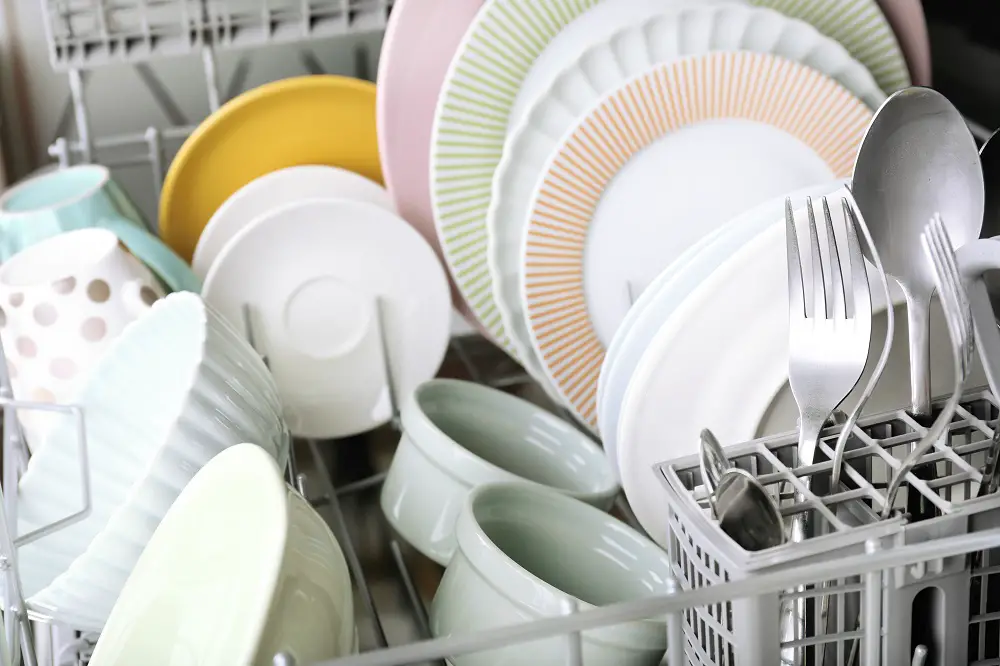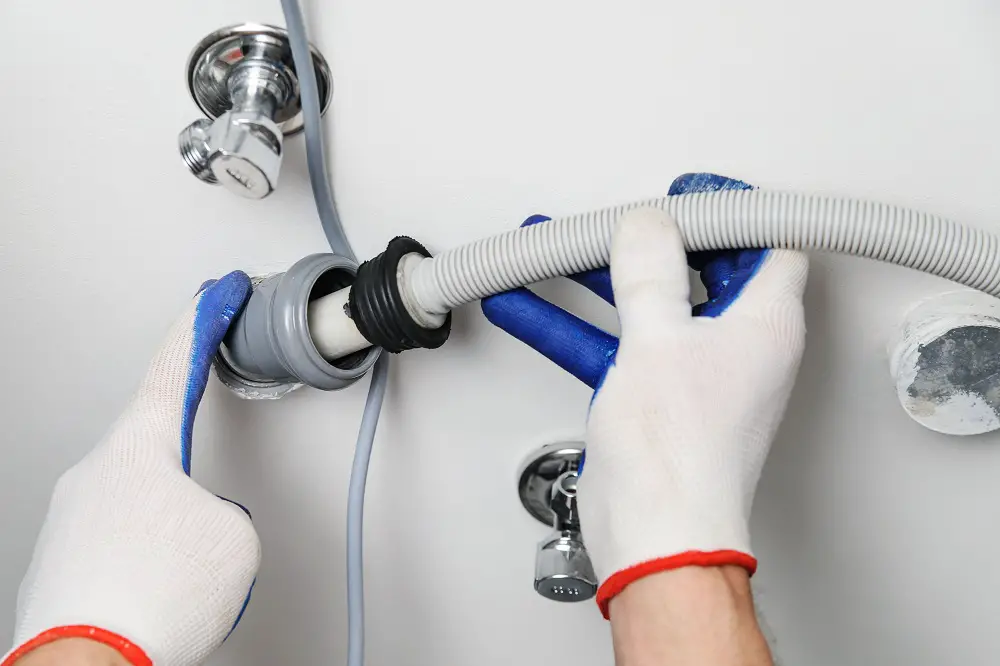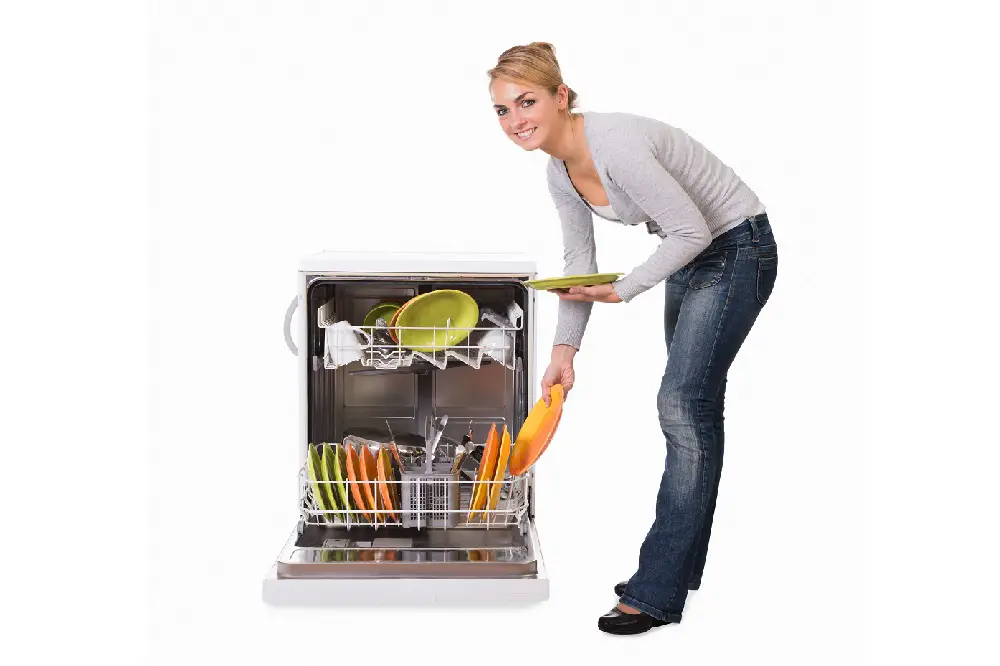Did you know you use at least 3.5 times more water than a dishwasher when you hand wash your dishes? Portable dishwashers not only ease your chore of washing dishes but also help save water and energy. But then, how much water does a portable dishwasher use?
A freestanding dishwasher uses about the same amount of water as a standard dishwasher. That’s about four gallons per cycle for a standard-sized dishwasher and three gallons for a compact model.
On the other hand, countertop dishwashers use just about 2 gallons of water.

Let’s look into the details of the water usage of portable dishwashers and how to reduce the water usage of these appliances.
Table of Contents
Water Usage of Free-Standing Dishwashers
Most modern dishwashers, designed with the latest technologies, use far less water than older models. Yet, they can clean your kitchenware equally well using powerful jets of water.
Some models even allow you to choose between more or less water depending on how dirty your dishes are. This helps save money on your utility bills.
While a standard dishwasher can use as little as 5 gallons of water per cycle, the Energy Star-certified models use even less – about 3 – 4 gallons per cycle.
Typically, the 24” free-standing dishwashers have a similar load capacity to standard dishwashers. Hence, the water usage of such dishwashers will be almost as much as the built-in models.
However, the slimline 18” free-standing portable dishwashers have a reduced capacity, hence, reduced water usage.
Different dishwasher wash cycles use different amounts of water.
Often, the Heavy wash program utilizes the most water, while the Glass and Eco wash programs use the least.
Here’s the average water usage for different models of free-standing dishwashers for a normal wash program:
| Dishwasher Model | Water Usage |
|---|---|
| RCA 18” | 2.5 – 5 gallons (9.7 – 19 L) |
| SPT 24” | 2.85 – 5.6 gallons (10.8 – 21.5 L) |
| SPT 18” | 2.5 – 5 gallons (9.7 – 19 L) |
| Whirpool 24” | 3.5 – 7.4 gallons (13.4 – 28.1 L) |
| EdgeStar 18” | 3.1 gallons (12.1 L) |
Water Usage of Countertop Dishwashers
Countertop dishwashers, which are smaller in size and have lesser load capacity, generally use much less water than free-standing models. Such dishwashers are ideal if you live alone or have two members in your household.
However, if you tend to cook your meals and use a lot of vessels, countertops might not be the best option owing to their limited capacities.
Some countertop models have a built-in water tank that you can manually fill. You can use dishwashers with the inlet hose connections or even without them.
| Dishwasher Model | Water Usage |
|---|---|
| Farberware 24” | 1.3 gallons (4.92 L) |
| RCA 24” | 3 gallons (11.3 L) |
| Danby DDW631SDB | 2.85 gallons (10.8 L) |
| Homelabs HME010033N | 2.85 gallons (10.8 L) |
| hOmelabs | 3.1 gallons (11.7 L) |
Water Cost of Portable Dishwashers
The average cost per gallon of water in the United States is $0.009.
| Free-standing dishwasher | Countertop dishwasher | |
|---|---|---|
| Water Usage | 4 gallons | 2.6 gallons |
| Water Cost per Load | $0.036 | $0.0234 |
| Annual Water Costs | $13.14 | $8.54 |
The average water usage of free-standing dishwashers is 4 gallons (15.5 L), which results in $0.036 water costs for one use.
Assuming you use your dishwasher every night, the annual water cost is $13.14, considering normal load water usage.
As for countertop dishwashers, assuming an average water usage of 2.6 gallons (9.86 L), the water cost for one wash cycle amounts to $0.0234.
Assuming you run your dishwasher’s normal cycle daily, the annual cost will be only $8.54.
How to Reduce the Water Usage of Portable Dishwashers?
Handwashing a load of dishes uses at least 27 gallons of water. On the other hand, an energy-saving dishwasher only uses about three or four gallons in an entire cycle.
On average, a running tap uses the same amount of water in two minutes, or the equivalent of washing eight dishes. Opting for an Energy Star-certified dishwasher saves almost 80% more water than washing your dishes at a running sink.
Not only do these dishwashers use less water, but they also use it more efficiently. The appliance filters and reuses the water throughout the cycle to minimize water usage.
While using a portable dishwasher helps save water as is, here are some tips to reduce water usage further:
- Look for an energy- and water-saving portable dishwasher when purchasing a new appliance. Check the EnergyGuide label to compare the efficiency options.
- For only 1-2 members in your household, opt for a countertop dishwasher. The smaller the load capacity, the lesser the water usage.
- Avoid rinsing dishes before loading them into the dishwasher; it increases water usage. You only need to scrape off leftover food, not rinse.
- Use a quality detergent to ensure your dishes come clean in a single wash. Check the manufacturer’s recommendations for the type and quantity of detergent.
- Choose an eco-setting; it uses a lower temperature (hence less energy) and less water for each cycle.
- As much as possible, run a full load in your portable dishwasher. This helps avoid running unnecessary cycles. However, avoid overloading your dishwasher.
- Ensure the inside of your dishwasher is clean, including the water-spraying holes in the rotating arms. This eliminates having to run multiple dishwasher cycles if your dishes don’t come out clean.
- Load the items in a water-efficient way. This means loading large items at the back and sides of the racks and avoiding keeping big plates at the front.
- Avoid leaving the faucet on with the inlet hose connected to it between uses. If there are any leaks or drips, it leads to water wastage.
- Regular maintenance of your dishwasher is essential to keep it working efficiently.
5 Reasons Your Portable Dishwasher Uses Too Much Water
If you’ve noticed that your portable dishwasher is using more water than usual, it could be due to a variety of factors.
In this section, we’ll dive into five possible reasons why your dishwasher may be using too much water, and provide some practical solutions to help you get it back to running at peak efficiency
1) Clogged or dirty filters
A portable dishwasher’s filters are designed to trap food particles and debris during the wash cycle, but if they become clogged or dirty, water may not be able to flow through them properly, leading to higher water usage.
Clean or replace the filters regularly, according to the manufacturer’s instructions, to ensure that they do not become clogged or dirty. This will allow water to flow freely through the dishwasher and reduce water usage.
Follow our 6 Steps To Clean a Portable Dishwasher (Fast & Thorough).
2) Malfunctioning spray arms
Spray arms in a dishwasher distribute water and detergent to clean dishes. If they become damaged, clogged, or misaligned, they may not be able to spray water effectively, leading to higher water usage as the dishwasher tries to compensate.
Inspect the spray arms for damage, clogs, or misalignment. Clean them as needed, and replace them if they are damaged. This will ensure that water is distributed effectively during the wash cycle.
3) Overloading
Overloading a portable dishwasher with too many dishes can block water from reaching all the surfaces that need to be cleaned, causing the dishwasher to use more water to compensate.
Avoid overloading the dishwasher by following the manufacturer’s recommended loading instructions. This will ensure that all surfaces are accessible to the water and detergent during the wash cycle.
Want some more tips for an effective usage? Read our article How to Use Countertop Dishwasher.
4) Hard water
Hard water contains minerals like calcium and magnesium that can cause buildup inside a dishwasher, leading to less effective cleaning and higher water usage as the dishwasher tries to compensate.
Install a water softener or use a water softening additive to prevent mineral buildup in the dishwasher. This will help the dishwasher operate more efficiently.
5) Improper installation
If a portable dishwasher is not installed correctly, it may not be able to fill or drain properly, leading to higher water usage during the wash cycle.
Ensure that the dishwasher is installed correctly, with all hoses and connections properly attached and sealed.
For countertops, this is a must-read: How to Hook up a Countertop Dishwasher?
Conclusion
Portable dishwashers are an excellent choice to ease your chore of dishwashing while also reducing your water and energy usage. These portable appliances use less water than handwashing. However, Energy Star-rated models use even lesser energy and water.
Additionally, there are other ways to reduce the water usage of portable dishwashers. This includes running a full load, using suitable detergent, loading items in a water-efficient manner, regular appliance maintenance, and choosing eco-setting at times.



